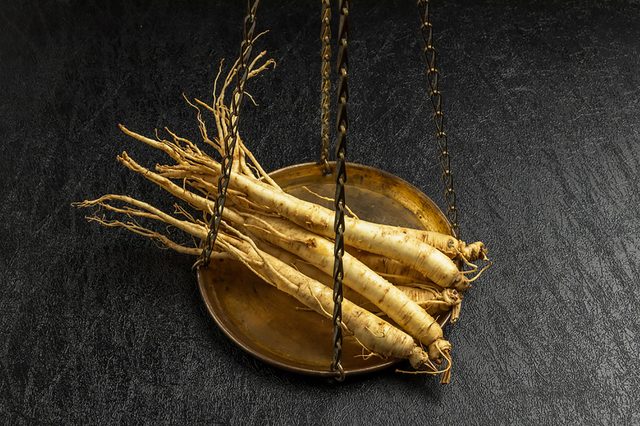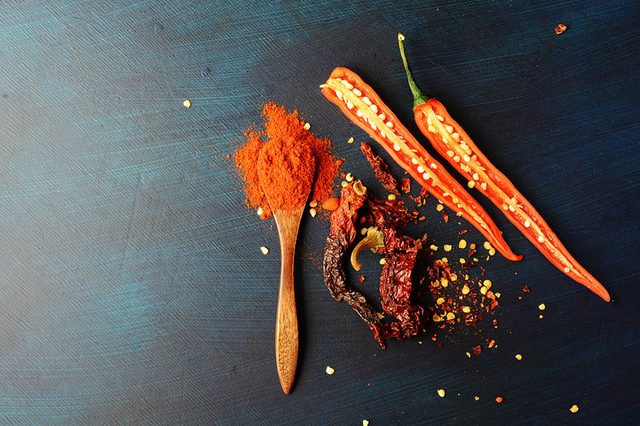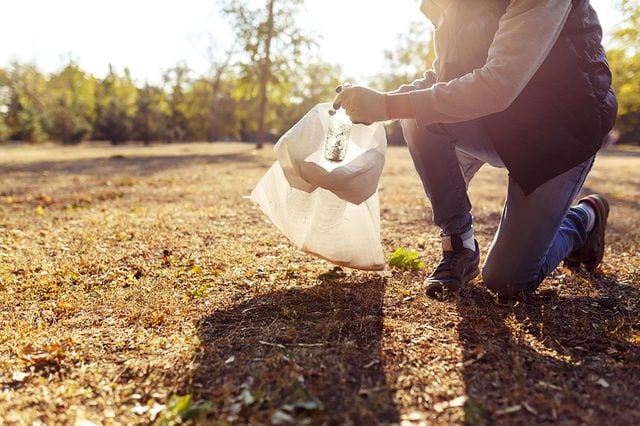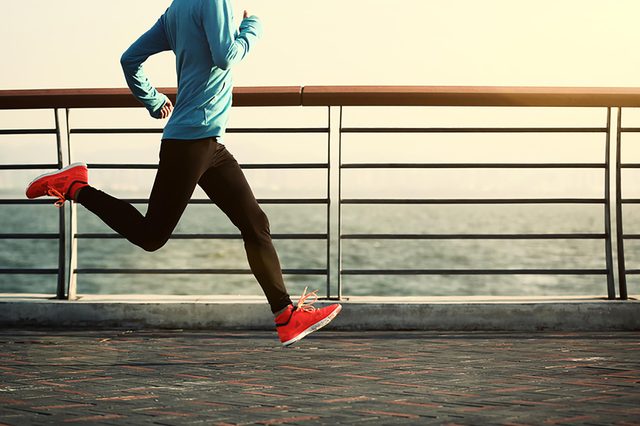
Sniff some vanilla or lavender
Certain aromas can lift your mood by influencing the production of endorphins—the brain’s “feel-good” chemicals. For example, the scent of vanilla can help release endorphins and reduce anxiety, which is often associated with depression. According to a study at the Memorial Sloan-Kettering Cancer Center, patients undergoing MRIs who breathed vanilla-scented air reported 63 percent less anxiety than those who breathed unscented air. To get the endorphin-boosting benefits of vanilla, add a drop or two of vanilla extract to the pot before the coffee brews, light some vanilla-scented candles, or add vanilla essential oil to your bathwater. In another study, conducted on college students, inhaling the aroma of lavender essential oil improved symptoms of depression and insomnia. You can dab lavender oil on your wrists and temples or diffuse it in the air with an inexpensive device you can pick up at the health food store.

Take a little ginseng
Ginseng may benefit people who are feeling fatigued and over-stressed and those recovering from a long illness. The herb has been shown to balance the release of stress hormones in the body and support the organs that produce these hormones. It may also help release endorphins. There is some scientific evidence that ginseng improves mental performance, including memory and concentration, and is useful in reducing blood sugar levels in people with type 2 diabetes. Other benefits may include treating some cardiovascular conditions (including high blood pressure and high cholesterol levels), chronic obstructive pulmonary disease (emphysema, chronic bronchitis) and bothersome menopausal symptoms. Animal studies suggest it helps protect nerves from damage (including damage due to diabetes), helps the liver restore itself after damage, aids digestion and protects the stomach against ulcers caused by too much acid or aspirin. Learn the 10 things happy people do every day.

Take a group exercise class
Group exercise has some distinct advantages, according to a recent study. Not only will friends spur you on if you’re flagging, but the shared effort may give your endorphin levels an extra boost. Researchers in 2009 found that college crews who rowed in synchronization had an increased rush of these feel-good hormones compared with those who rowed alone. But all exercise is good, whether solitary or with others. Try walking, dancing, aerobics and running to transport yourself into a trance-like state. The rhythm of continuous exercise releases endorphins and encourages reflective thought.

Seek out daily laughter
It’s been observed that children laugh about 300 times a day, whereas adults laugh, on average, only about five times each day. The more we laugh, the better our perspective. Problems also seem to shrink, bringing an increased sense of energy. Laughter is sometimes described as “inner jogging.” Research has shown that it can help to lower blood pressure; reduce stress hormones; boost immune function by raising levels of infection-fighting cells; release endorphins, the body’s natural painkillers; and produce a general sense of wellbeing. Don’t miss these other 12 ways to wake up happier every day.

Have sex
We are programmed to enjoy sex, but we often give it a low priority, so it simply doesn’t happen. But this is to ignore one of nature’s great relaxants and a joyful de-stressing activity which burns calories, too. As mentioned earlier, however, when we are anxious or stressed our desire may be switched off, and we may need to give it a helping hand. Try to create a romantic atmosphere. Buy an oil burner, to produce a sensuous fragrance, and try giving each other a relaxing massage in a candlelit room, using aromatic oils such as jasmine, rose or bergamot. Put on soothing music, and take time to slow down. Enjoy being together with your partner in a relaxed and fun way.
Give as high a priority to this activity as you do to anything else in your life that you consider important. Research shows that being touched reduces stress—as well as alleviating pain and helping to heal injuries, according to Stanford University. Taking time for those intimate moments also soothes us, uplifts us (due to the release of those mood-enhancing endorphins), and gives a sense of belonging and security.

Savor some chocolate
Chocolate-lovers will be delighted to hear that dark chocolate provides protection against heart attacks and strokes. Thanks to its high content of polyphenols and other antioxidants, dark chocolate reduces inflammation, lowers blood pressure, reduces ιbad᾿ LDL cholesterol, boosts ιgood᾿ HDL cholesterol and protects the health of your arteries. It also contains chemicals that release endorphins, the body’s pain-relieving and pleasure-promoting hormones. A sense of wellbeing is vitally important to keeping your cardiovascular system in top condition. In one major review of 139 studies conducted over nearly 40 years, researchers concluded that chocolate consumption could lower the risk of cardiovascular death by around 19 percent. That’s the good news. The bad news, for some, is that all you need to eat to improve your health is 6.7g per day. That’s equivalent to one small square two or three times a week—the heart benefits tend to disappear with consumption of larger amounts. The key to eating chocolate is to know when to stop and when not to indulge. If you are a chocoholic—and a craving for chocolate is the most common of all food cravings in both men and women—try taking a brisk 15-minute walk. Researchers at the University of Exeter found that a walk allayed cravings in chocoholics, even in tempting situations.

Listen to music
Listening to music you love triggers joy by unleashing feel-good brain chemicals. Turn on this song that’s been shown to reduce anxiety by up to 65 percent.

Eat something spicy
The hot, spicy taste of foods is not, in fact, a taste sensation but a feeling of pain. Capsaicin—the chemical compound that makes chili peppers hot—binds to proteins, or pain receptors, of nerve cells in the mucous membranes of the nose and mouth. The nerve impulses produced in this way pass via the trigeminal nerve into the brain, creating a painful burning feeling. The same receptors also react to heat, so that when heavily spiced food is eaten hot, the effect is even more intense. However, the pain is offset by the body’s reaction, which is to release endorphins—naturally occurring opioids that produce a feeling of wellbeing—which could explain the popularity of hot, spicy food. Another positive effect of hot spices is that they kill pathogens and promote sweating—the latter effect being especially useful for cooling the body in hot climates.

Volunteer
There really is something to the saying “It’s better to give than to receive.” A National Institute of Health study had 19 women lie in fMRI scanners while choosing or being told to give away portions of the $100 researchers gave them. Even though volunteers could have kept the money at the end of the session, the pleasure centers in their brains lit up when they gave money away, whether it was voluntary or not. What’s more, “people experience even more brain activation when they give voluntarily,” lead study author and University of Oregon economics professor Bill Harbaugh said in a statement. Donate to your favorite cause, or treat a friend next time you meet up for coffee.

Go for a run
Turns out your friends weren’t kidding when they gushed about a “runner’s high.” A small German study found that after a two-hour jog, athletes had higher levels of endorphins in their brains than they did before the run. They could feel the results, too; the volunteers reported a boost in euphoria and happiness ratings after exercise. Plus, a Canadian mouse study found a link between running and dopamine, a neurotransmitter that helps control the brain’s pleasure centers. Don’t miss these other 50 little changes that will make you happier.
